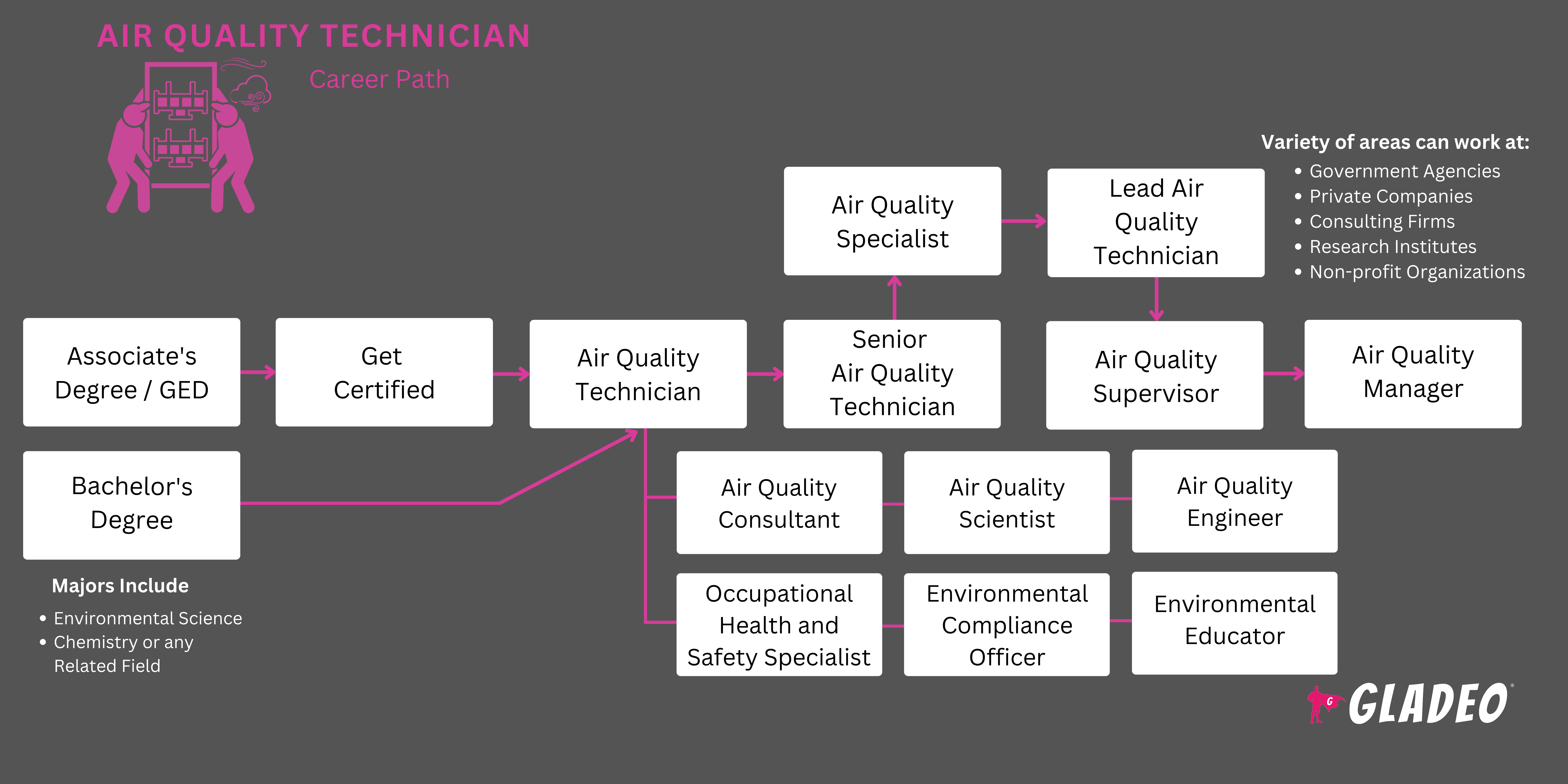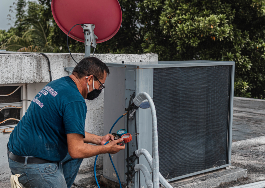聚光灯
Air Quality Specialist, Air Quality Inspector, Environmental Technician, Environmental Health and Safety Specialist, Indoor Air Quality Specialist, Emissions Technician, Pollution Control Technician, Air Monitoring Technician, Environmental Compliance Officer, Environmental Scientist, Environmental Consultant
Healthy air is essential for every one of us—and all the animals living on the surface of our planet, too. Unfortunately, the World Health Organization reports that 9 out of 10 people regularly breathe polluted air!
This global air quality problem is causing ~7 million deaths per year “from exposure to fine particles” that contribute to “strokes, heart disease, lung cancer, chronic obstructive pulmonary diseases, and respiratory infections.”
We need cleaner air—and that’s where Air Quality Technicians come in! Working at the forefront of environmental protection, they help to ensure our air quality standards by collecting samples, running tests, analyzing data, and locating sources of pollution.
Some Air Quality Technicians focus on indoor air quality in homes or commercial buildings. More advanced roles have broader responsibilities, including outdoor fieldwork, working in industrial settings, and running tests in laboratories. Such positions may involve close collaboration with environmental scientists, engineers, and government agencies—along with more education and training requirements!
- Monitoring and improving environmental health
- Reducing air pollution and protecting ecosystems
- Assisting in the development of sustainable practices
- Collaborating with diverse teams for a critical cause
工作日程
Air Quality Technicians typically work full-time, with some overtime required during environmental crises or for project deadlines. The role may include travel to different testing sites and occasional fieldwork.
典型职责
- Inspect residential homes, public spaces, and businesses, to identify and address air quality issues
- Visit factories, construction sites, and other workplaces where workers might be exposed to harmful pollutants
- Collect and analyze air samples (such as for carbon monoxide, carbon dioxide, pollutants, or other contaminants such as mold, radon, dust mites/allergens, asbestos, or volatile organic compounds emitted from paints, lacquers, cleaning supplies, adhesives, permanent markers, pesticides, building materials, etc.)
- Change sampling equipment filters. Diagnose and repair minor issues with monitoring equipment
- Install pollution monitoring equipment such as remote sensors. Utilize data drawn from remote sensing devices
- Use equipment like gas chromatographs and spectrometers for detailed analysis
- Interpret data and compile findings into comprehensive air quality reports. Discuss results with clients
- Ensure organizations understand environmental regulations and standards
- Suggest effective pollution control or other remedial measures
- Collaborate with environmental scientists and policymakers
- Label and track samples to maintain integrity during transport to labs for testing
额外责任
- Conduct regular maintenance and calibration of air monitoring equipment
- Engage in public education about air quality and its impacts
- Stay up to date on pollution prevention and applicable air quality regulations
软技能
- 适应性
- 分析性思维
- 注重细节
- 清晰的沟通
- 好奇心
- 独立性
- 耐心
- 解决问题
- 团队合作
技术技能
- Basic knowledge of chemistry and physics
- Data input, data analysis programs, and report writing
- Proficiency in using air sampling and analysis instruments such as high-volume air samplers, gas chromatographs, mass spectrometers, flame ionization detectors, photoionization detectors, beta attenuation monitors, nephelometers, particle sizers and counters, volatile organic compound analyzers, multi-gas monitors, and aerosol monitors
- Knowledge of using moisture meters, mold test kits, radon test kits, and anemometers
- Familiarity with Geographic Information Systems
- Proper wear of personal protective equipment, when needed
- Understanding of environmental regulations and standards
- Home inspection service providers
- Environmental consulting firms
- 政府机构
- Industrial manufacturing plants
- 研究机构
- Non-profit environmental organizations
Air Quality Technicians are key to ensuring suitable air quality for communities. They may rotate between working in laboratories, at industrial sites, and outdoors where they may be exposed to inclement conditions.
Depending on the job, continuous learning may be necessary due to the evolving nature of environmental standards and technologies. Staying up-to-date requires an ongoing investment in professional development and adaptation to new methods and regulations.
Over the past 50 years, air quality in America has improved thanks, in part, to the Clean Air Act. Since 1970, “the combined emissions of criteria and precursor pollutants have dropped [in the US] by 78%,” notes the Environmental Protection Agency.
But there’s plenty of work to be done, with ~36% of Americans still living “in places with failing grades for unhealthy levels of ozone or particle pollution,” per the American Lung Association.
As public awareness rises, the demand for cleaner air continues to shape federal and state policies as well as drive community action. These things, in turn, push organizations to advance more sustainable practices and shift away from less renewable energy sources that contribute to air pollution.
People in this field were often drawn to environmental science from a young age. They may have also enjoyed outdoor activities, and been curious how modern society has impacted our natural environment!
- An associate’s or bachelor’s degree is needed to enter this field, depending on the position
- Note, for those working for residential customers, employers may only require a certification, not a degree
- Common college degree majors for this field include environmental science, biology, chemistry, or chemical engineering
- Relevant coursework may cover topics such as:
- 大气化学
- 数据分析
- Environmental Policy and Regulation
- 环境科学
- 地理信息系统(GIS)
- 职业健康与安全
- Some states may require a license or registration to work in this field, so check with your state’s Environmental Protection Agency regional office or college program advisor
- Internships with environmental agencies can provide valuable job experience
- Optional certifications may include the National Registry of Environmental Professionals’s Certified Indoor Air Quality Manager (which must be renewed annually) or the International Association of Certified Indoor Air Consultants’ IAC2 Radon Certified credential
- Seek an accredited program in environmental science, biology, chemistry, or chemical engineering
- Keep in mind, that residential home air quality technicians might only need a certification or associate’s versus a bachelor’s degree! Certification training programs usually only cost a few hundred dollars
- 将学费成本与现有的经济援助和奖学金机会进行权衡
- 决定课程形式(校内课程、在线课程或混合课程)
- 考虑毕业后的结果,如就业率和校友网络的实力
- Decide what kind of technician you want to be. If residential, you may only need a certification and perhaps a license in your state. For anything else, you’ll probably need a bachelor’s degree to get hired!
- Review job posts and read the job descriptions to see what current qualifications and specializations employers are looking for in your area
- Important high school courses to prepare for this field include chemistry, biology, and environmental science
- Volunteer with local environmental groups or participate in school science clubs
- Gain experience through internships or possible training opportunities such as at Air Knowledge
- Contact a local business or agency that conducts air quality testing. Ask if you can do an informational interview with a working Air Quality Technician
- Watch videos and read blogs like Airly and AirNow to stay informed about industry trends. Additional blogs include:
- Engage in air quality-related discussion groups like r/AirQuality on Reddit or other forums
- Join professional organizations like the National Association of Clean Air Agencies (NACAA)
- Keep track of work and academic accomplishments for your resume and college applications

- Research potential local employers and visit their website career pages for job openings
- Check out job postings on Indeed, NACAA’s job board, USAJobs, and other portals
- Sometimes employers put applicants in a Catch-22 situation, wanting them to have relevant work experience—which is hard to get if you can’t get a job!
- If needed, apply for internships to gain work experience to make your applications more competitive
- Find a good Air Quality Technician resume template to use
- Include resume keywords such as Air Quality Monitoring, Emission Control Technologies, Environmental Regulations, Data Analysis, Indoor Air Quality, Pollutant Source Identification, Air Quality Sensors, GIS and Remote Sensing, Clean Air Technologies, Research and Development, Compliance Monitoring, etc., as applicable
- Let everyone in your network know you’re looking for job opportunities. Many technicians started their careers through tips from people they knew!
- 询问前任主管和大学教授是否愿意为你提供推荐信或写推荐信
- Prepare for interviews by brushing up on relevant air quality terminology and trends
- Review sample Air Quality Technician interview questions
- Use your school’s career center for help with resume and interview preparation
- 询问您的项目经理是否与当地雇主或招聘人员有联系
- 面试时穿着专业
- How to climb the ladder in this field depends on where you’re starting, so discuss career progression with your supervisor!
- If you’re a certified residential Air Quality Technician, you could go on to pursue a bachelor’s degree to qualify for higher-paying positions with more responsibility
- If you have a bachelor’s, ask your employer if earning a master’s in environmental science with a focus on air quality would benefit them and qualify you for a promotion
- If they say no, ask about pursuing specialized certifications instead…or look at job ads for other positions to see if they require a master’s, and whether the pay is better or not
- If necessary to advance, consider switching employers when the time is right!
- Volunteer to lead air quality monitoring projects or assist with important research, if qualified
- Mentor junior technicians or interns to develop leadership skills and share your expertise
- Stay up-to-date on advancements in air quality monitoring technologies (check out our Recommended Tools/Resources > Websites)
- Grow your professional network by participating in professional organizations. This is a great way to learn about new opportunities
网站
- 董事会认证的环境专业人员学院
- Air & Waste Management Association
- Air Knowledge
- Airly
- AirNow
- Air Pollution News
- Air Quality News
- AirQualityNews.com
- 美国化学学会
- 美国工业卫生协会
- 美国公共卫生协会
- 美国微生物学会
- ASTM国际组织
- 环境、健康和安全审计员证书委员会
- 临床实验室劳动力协调委员会
- Daily Dose Of Air Pollution
- 环境保护局
- Environmental Science.org
- Indoor Air Quality
- National Association of Clean Air Agencies
- 全国环境专业人员协会
- 全国环境卫生协会
- National Environmental Health Science and Protection Accreditation Council
- 国家职业安全与健康研究所
- National Radon Safety Board
- 国家环境专业人员登记处
- 职业安全与健康管理局
- Rocky Mountain Water Quality Analysts Association
- Society of Environmental Toxicology and Chemistry
- 大学大气研究公司
书籍
- Air Quality, by Wayne T. Davis, et al.
- Climate Restoration: The Only Future That Will Sustain the Human Race, by Peter Fiekowsky and Carole Douglis
- Indoor Air Quality: The Latest Sampling and Analytical Methods, by Kathleen Hess-Kosa
Air Quality Technicians play an important role in keeping our air clean and healthy to breathe. But that’s only one aspect of the monumental task of conserving our environment! There are many related career opportunities to consider, such as:
- 农业与食品科学技术员
- 生物学技术员
- 棕地重建专家
- 化学技术员
- Climate Change Analyst
- 临床实验室技术员
- 保护科学家
- 环境合规督察
- 环境工程技术员
- 环境科学家
- 法证科学技术员
- 地质技术员
- 危险废物技术员
- 水文学家
- 工业卫生学家
- Laboratory Technician
- 职业健康与安全专家
- 水和废水处理厂及系统操作员
- 水资源专家
新闻联播

特色工作

在线课程和工具








